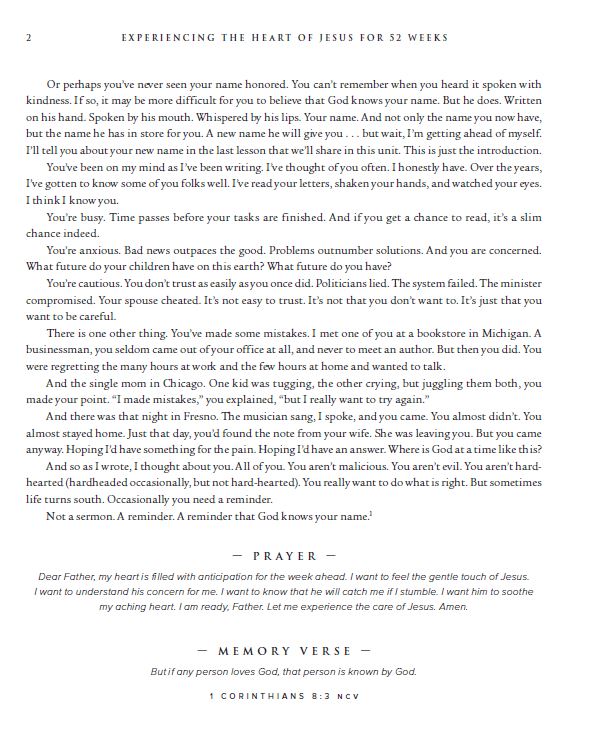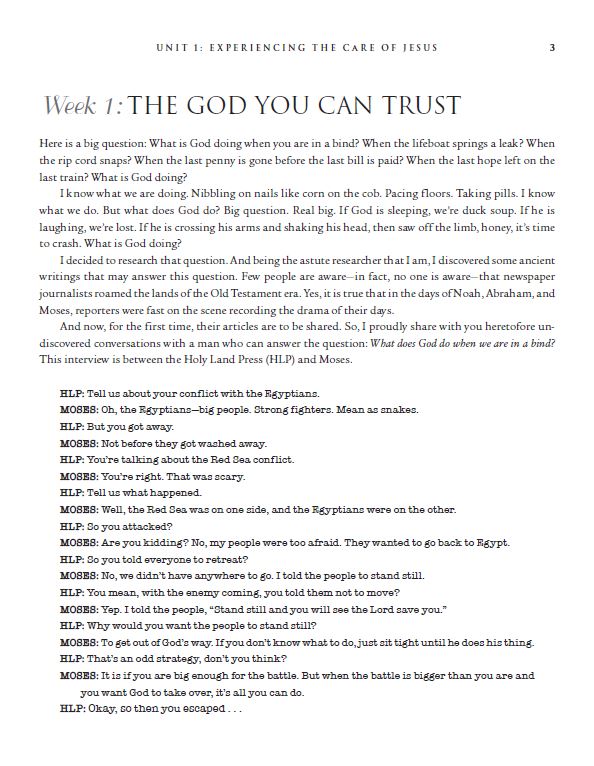"I could have gone to college on a golf scholarship," a fellow told me just last week on the fourth tee box. "Had an offer right out of school. But I joined a rock-and-roll band. Ended up never going. Now I'm stuck fixing garage doors."
"Now I'm stuck." Epitaph of a derailed dream.
Pick up a high-school yearbook and read the "What I want to do" sentence under each picture. You'll get dizzy breathing the thin air of mountaintop visions. Yet take the yearbook to a twentieth-year reunion and read the next chapter. Some dreams have come true, but many have not. Why? Because something happens to us along the way.
Convictions to change the world downgrade to commitments to pay the bills. Rather than make a difference, we make a salary. Rather than look forward, we look back. Rather than look outward, we look inward. And we don't like what we see.
If anyone had reason to doubt that God cared for his broken dreams, it was Moses. You remember his story. Adopted nobility. An Israelite reared in an Egyptian palace. A privileged upbringing. But his most influential teacher had no degree. His mother was a Jewess hired to be his nanny. "Moses," you can almost hear her whisper, "God has put you here on purpose. Someday you will set your people free. Never forget, Moses. Never forget."
Moses didn't.
The flame of justice grew hotter until it blazed.
Moses saw an Egyptian beating a Hebrew slave, and something inside him snapped. He lashed out and killed the Egyptian guard. The next day, Moses saw the Hebrew. You'd think the slave would say thanks. He didn't. Rather than express gratitude, he expressed anger.
Are you thinking of killing me as you killed the Egyptian? — he asked in Exodus 2:14.
Moses knew he was in trouble. He fled Egypt and hid in the wilderness. He went from dining with the heads of state to counting heads of sheep. And so it happened that a bright, promising Hebrew began herding sheep in the hills. From the Ivy League to the cotton patch. From the Oval Office to a taxicab. From swinging a golf club to digging a ditch.
Moses thought the move was permanent. There is no indication he ever intended to go back to Egypt. In fact, there is every indication he wanted to stay with his sheep. Standing barefoot before the bush, he confessed,
Who am I that I should go to Pharaoh and bring the Israelites out of Egypt? — Exodus 3:11
Why Moses? Or, more specifically, why eighty-year-old Moses? The forty-year-old version was more appealing. The Moses we saw in Egypt was brash and confident. But the Moses we find four decades later is reluctant and weather-beaten. Had you or I looked at Moses back in Egypt, we would have said, "This man is ready for battle." Educated in the finest system in the world. Trained by the ablest soldiers. Instant access to the inner circle of the Pharaoh. Moses spoke their language and knew their habits. He was the perfect man for the job.
Moses at forty we like. But Moses at eighty? No way. Too old. Too tired. Smells like a shepherd. Speaks like a foreigner. What impact would he have on Pharaoh? He's the wrong man for the job. And Moses would have agreed. "Tried that once before," he would say. "Those people don't want to be helped. Just leave me here to tend my sheep. They're easier to lead."
Moses wouldn't have gone. You wouldn't have sent him. I wouldn't have sent him. But God did.
God said Moses was ready.
And to convince him, God spoke through a bush. (Had to do something dramatic to get Moses' attention.) "School's out," God told him. "Now it's time to get to work." Poor Moses. He didn't even know he was enrolled.
God puts us back in service to remind us that He cares for us.
When we make mistakes, He does not banish us to a spiritual junkyard. No, He salvages our mistakes because He cares for us. He removes the rust and grime, buffs out the scratches, and hammers out the dents in our frame until we are in working condition again.




















No comments:
Post a Comment